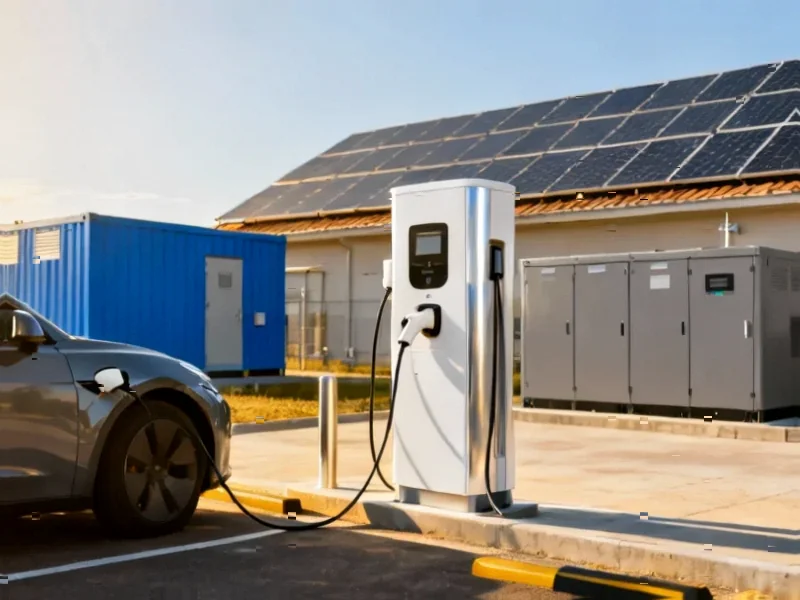According to Innovation News Network, the UK government is injecting £10 million into developing off-grid electric vehicle charging stations that can operate without traditional grid connections. The funding targets England’s strategic road network of motorways and major A-roads, focusing on technologies that combine renewable energy sources like solar and wind with on-site battery storage. Each supported project must provide ultra-rapid charging for at least 12 EVs simultaneously, delivering 120-145 miles of range in just 15 minutes. UK Minister for Aviation, Maritime and Decarbonisation Minister Keir Mather emphasized this initiative builds on existing EV adoption efforts, including the £650 million Electric Car Grant that has already supported over 25,000 drivers with discounts up to £3,750. This strategic investment represents a fundamental shift in how charging infrastructure can be deployed across challenging locations.
The Technical Architecture Behind Off-Grid Charging
What makes this initiative particularly innovative is the engineering required to deliver ultra-rapid charging without grid dependency. Traditional 350kW DC fast chargers typically demand electrical connections equivalent to powering 300 homes simultaneously. Off-grid systems must generate and store this immense power through integrated renewable generation and sophisticated battery management. The technical challenge involves creating microgrids that can harvest solar and wind energy continuously while managing the sudden, massive power draws during charging sessions. These systems likely employ lithium-ion or emerging solid-state battery technologies with advanced thermal management to handle the rapid charge-discharge cycles without degradation.
Addressing the UK’s Grid Limitations
The UK’s electrical grid presents unique challenges for EV infrastructure expansion. Many rural areas and even some strategic road network locations lack the substation capacity or distribution infrastructure to support multiple ultra-rapid chargers. Traditional grid upgrades can take years and cost millions per location, creating deployment bottlenecks. This off-grid approach effectively bypasses these constraints by creating self-contained energy systems. The economic implications are significant – while individual off-grid stations may have higher upfront costs, they eliminate the need for expensive grid reinforcement and can be deployed in months rather than years. This acceleration could be crucial for meeting the UK’s 2035 deadline for ending new petrol and diesel car sales.
The Reliability and Scalability Questions
While promising, off-grid charging faces legitimate technical hurdles that the funded projects must overcome. Renewable energy generation is inherently intermittent, and battery storage has finite capacity. During extended periods of low sunlight and wind, these stations risk becoming unavailable unless they incorporate backup generators or alternative power sources. The systems must be engineered to maintain reliability through seasonal variations and peak demand periods. Additionally, scaling these solutions presents challenges – as EV adoption increases, the energy requirements for each location will grow exponentially. The successful projects will need to demonstrate not just initial functionality but sustainable operation under increasing load conditions.
Broader Market and Industry Impact
This funding signals a strategic shift in how governments approach EV infrastructure deployment. Rather than waiting for traditional utilities to upgrade grids, this model empowers private operators to create distributed, resilient charging networks. The success of these projects could inspire similar approaches globally, particularly in regions with underdeveloped electrical infrastructure. For charging equipment manufacturers, this creates new market opportunities for integrated renewable energy systems rather than simple charging hardware. The technology developed through this initiative could also find applications beyond transportation, potentially revolutionizing how remote communities and industrial sites access reliable, high-power electricity without traditional grid connections.
The Road Ahead for Off-Grid EV Infrastructure
Looking forward, the £10 million investment represents just the beginning of what could become a fundamental rethinking of energy infrastructure. As battery technology continues to improve and renewable energy costs decline, fully self-sufficient charging stations could become economically viable without subsidies. The next evolution will likely involve vehicle-to-grid capabilities, where EVs themselves become part of the energy storage solution. The projects funded through this initiative will provide crucial real-world data on performance, maintenance requirements, and total cost of ownership that will inform future infrastructure investments. If successful, this approach could ultimately make EV charging more accessible in remote areas than traditional petrol stations ever were.




